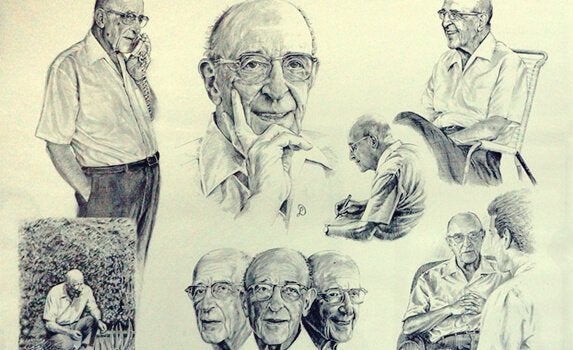Carl Rogers’ humanist psychology has aroused so much admiration that it has been defined as the silent revolution. Rogers brought the most vital optimism to psychotherapy to convince us that we all deserve to be the person we dreamed of being.
He spoke of authentic relationships and the need to prosper to the fullest as human beings. There are many personality theories in psychology, however, it must be said that they all have common ground, points that are consistent with similar ideas and approaches.
- However.
- If we do a small retrospective of all.
- Within this range of interesting theories.
- The positive vision of Carl Rogers and the human being stands out for bringing about a necessary change.
“Curious paradox: when I accept myself as I am, can I change”?Carl Rogers
Leaving behind this passive or deterministic vision, emphasized by psychoanalysis and conductism, the humanist psychology contemplated by the most influential psychotherapist in history speaks briefly of the freedom of the human being.
He emphasized our ability to move forward and create a better world, encouraged us to be responsible for ourselves, to open ourselves to experiences through non-directive therapy, which fosters self-knownness.
Carl Rogers’ humanist psychology actually fulfilled a concrete and essential goal: to facilitate aid, in fact, it was he who, after World War II, offered to provide psychological assistance to all those soldiers who were disabled or traumatized.
Until now, the only type of intervention these young people received was that of doctors: no one in the United States had taken a step beyond treating injuries and trying to analyze and intervene on emotions.
Soon after, Japan invited him to teach his techniques and ways of helping the country’s psychologists. Almost unknowingly, Rogers promoted a type of psychotherapy that daved and fascinated the world, which earned him a place as a Nobel Peace Prize nominee.
Carl Rogers’ life reflects one of the best-known principles of his theory: continuous updating and the effort we must feel realized, to gradually find what defines us, in an ongoing quest to achieve our goals. He himself, as curious as he may seem, began by orienting his career towards a very different field of psychology: agricultural science.
Later he became interested in the study of Eastern and Western religions, later graduating in history and theology; however, he was finally attracted to the world of psychopedagogy and the complex process by which we became who we are.
It was then that he met the theories of one of his personal heroes, John Dewey, who taught him that education should be based not only on an intellectual process, but also on an openness to experience.
Thus, and also influenced by existentialism, he began publishing books, studies and works until he was able to teach courses in clinical psychology, which soon became the cornerstone of humanist psychology, thanks to his client-centered therapy.
The patient figure has been left behind as being passive, and now there is someone capable of becoming a specialist in his own growth and personal trajectory.
The term “client” first appeared in Carl Rogers’ humanist psychology for a very clear reason: because, in this way, he focused on the relationship of equality with the therapist (unlike psychoanalysis).
In this way, he wanted to show absolute confidence in the human being in his positive transformation, in his ability to find strength, to break down defense mechanisms and to shape the vital impulse that is to perceive himself.
There’s a question we all asked ourselves in a moment: “Why is this happening to me?What Carl Rogers’ humanist psychology would do, first of all, would be to have a real empathy for the person, to connect with the client. worry about the situation you’re going through.
It is a meeting between one human being and another united by a common goal: to explore our true “I” to make more fulfilling decisions.
These are some of the most important points of Carl Rogers’ humanist psychology.
“In my relationships with people, I’ve discovered that, in the long run, it doesn’t help to act like it’s something I’m not. “Carl Rogers
Finally, and finally, there is one aspect that is certainly interesting to consider to better understand Carl Rogers’ humanist psychology, which has always distinguished him from other therapists and what has allowed him, in turn, to be one of the most influential psychologists, is that he always chose to force the person, not the problem.
It was he who looked at his clients from their authenticity, without falling into judgments, without directing them towards one strategy or another, without resorting to confrontation, the goal of their therapy was to listen, facilitate the recognition of emotions and help define their own. Personality.
Therefore, many of his strategies do not appear in textbooks, he has not used a clear methodology, but his psychological approach remains, today, one of the best strategies for traumatic processes or attachment problems.
references

